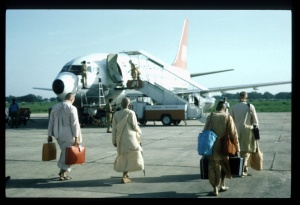CC Madhya 24.262: Difference between revisions
m (1 revision(s)) |
No edit summary |
||
| Line 1: | Line 1: | ||
{{ | [[Category:Sri Caitanya-caritamrta - Madhya-lila Chapter 24|C262]] | ||
<div style="float:left">'''[[Sri Caitanya-caritamrta|Śrī Caitanya-caritāmṛta]] - [[CC Madhya|Madhya-līlā]] - [[CC Madhya 24|Chapter 24: The Sixty-One Explanations of the Atmārāma Verse]]'''</div> | |||
<div style="float:right">[[File:Go-previous.png|link=CC Madhya 24.261|Madhya-līlā 24.261]] '''[[CC Madhya 24.261|Madhya-līlā 24.261]] - [[CC Madhya 24.263|Madhya-līlā 24.263]]''' [[File:Go-next.png|link=CC Madhya 24.263|Madhya-līlā 24.263]]</div> | |||
{{CompareVersions|CC|Madhya 24.262|CC 1975|CC 1996}} | |||
{{RandomImage}} | |||
==== TEXT 262 ==== | ==== TEXT 262 ==== | ||
<div | <div class="verse"> | ||
āmi tomāya bahu anna pāṭhāimu dine | :āmi tomāya bahu anna pāṭhāimu dine | ||
sei anna labe, yata khāo dui- | :sei anna labe, yata khāo dui-jane" | ||
</div> | </div> | ||
| Line 12: | Line 16: | ||
==== SYNONYMS ==== | ==== SYNONYMS ==== | ||
<div | <div class="synonyms"> | ||
''āmi''—I; ''tomāya''—for you; ''bahu''—much; ''anna''—food; ''pāṭhāimu''—shall send; ''dine''—every day; ''sei''—that; ''anna''—food; ''labe''—you shall take; ''yata''—whatever; ''khāo''—you can eat; ''dui-jane''—both of you. | |||
</div> | </div> | ||
| Line 19: | Line 23: | ||
==== TRANSLATION ==== | ==== TRANSLATION ==== | ||
<div | <div class="translation"> | ||
"Nārada Muni continued, 'Every day I shall send sufficient food to you both. You can take as much food as you want.' | |||
</div> | </div> | ||
| Line 26: | Line 30: | ||
==== PURPORT ==== | ==== PURPORT ==== | ||
<div | <div class="purport"> | ||
When a person takes to Kṛṣṇa consciousness, there is no need to care for material necessities. Kṛṣṇa says, yoga-kṣemaṁ vahāmy aham: ([[BG 9.22]]) “I personally carry all necessities to My devotees.” Why should one be anxious about the necessities of life? The principle should be that one should not want more than what is absolutely necessary. Nārada Muni advises the hunter to accept only what is absolutely necessary for him and his wife. The devotee should always be alert to consume only those things that he absolutely requires and not create unnecessary needs. | When a person takes to Kṛṣṇa consciousness, there is no need to care for material necessities. Kṛṣṇa says, ''yoga-kṣemaṁ vahāmy aham:'' ([[BG 9.22 (1972)|BG 9.22]]) “I personally carry all necessities to My devotees.” Why should one be anxious about the necessities of life? The principle should be that one should not want more than what is absolutely necessary. Nārada Muni advises the hunter to accept only what is absolutely necessary for him and his wife. The devotee should always be alert to consume only those things that he absolutely requires and not create unnecessary needs. | ||
</div> | </div> | ||
__NOTOC__ | |||
<div style="float:right; clear:both;">[[File:Go-previous.png|link=CC Madhya 24.261|Madhya-līlā 24.261]] '''[[CC Madhya 24.261|Madhya-līlā 24.261]] - [[CC Madhya 24.263|Madhya-līlā 24.263]]''' [[File:Go-next.png|link=CC Madhya 24.263|Madhya-līlā 24.263]]</div> | |||
__NOTOC__ | |||
__NOEDITSECTION__ | |||
Revision as of 06:31, 15 September 2021

A.C. Bhaktivedanta Swami Prabhupada
TEXT 262
- āmi tomāya bahu anna pāṭhāimu dine
- sei anna labe, yata khāo dui-jane"
SYNONYMS
āmi—I; tomāya—for you; bahu—much; anna—food; pāṭhāimu—shall send; dine—every day; sei—that; anna—food; labe—you shall take; yata—whatever; khāo—you can eat; dui-jane—both of you.
TRANSLATION
"Nārada Muni continued, 'Every day I shall send sufficient food to you both. You can take as much food as you want.'
PURPORT
When a person takes to Kṛṣṇa consciousness, there is no need to care for material necessities. Kṛṣṇa says, yoga-kṣemaṁ vahāmy aham: (BG 9.22) “I personally carry all necessities to My devotees.” Why should one be anxious about the necessities of life? The principle should be that one should not want more than what is absolutely necessary. Nārada Muni advises the hunter to accept only what is absolutely necessary for him and his wife. The devotee should always be alert to consume only those things that he absolutely requires and not create unnecessary needs.